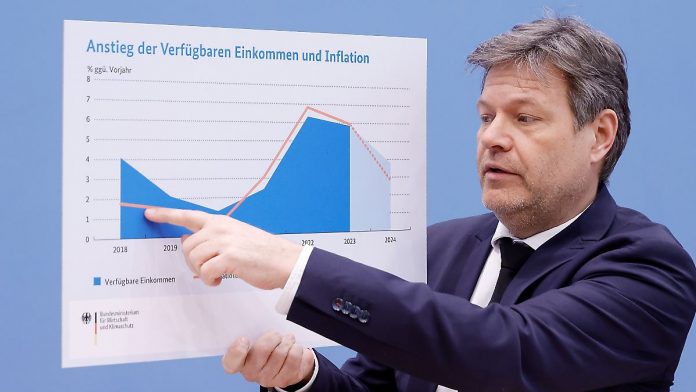2024 only mini-growth
Habeck wants to “boost reform” of the ailing economy
This audio version was artificially generated. More info | Send feedback
The crisis in the German economy will last longer, warns Economics Minister Habeck. But he also shows a way out: the “reform booster”. This should be achieved through incentives for workers and investments, the reduction of bureaucracy and the Growth Opportunities Act.
From the Federal Government's perspective, the economic prospects for this year have deteriorated significantly – Economics Minister Robert Habeck therefore wants to bring the economy forward with a “reform booster”. “It's about nothing less than defending the competitiveness of the German industrial location,” explained Habeck in Berlin. The focus is particularly on curbing the labor shortage, reducing bureaucracy and improving the framework conditions for investments.
According to the annual economic report presented by Habeck, gross domestic product (GDP) growth of 0.2 percent is expected for the German economy in 2024. This is significantly less than assumed in the autumn projection: In October, the federal government assumed possible GDP growth of 1.3 percent this year.
“We are coming out of the crisis more slowly than we had hoped,” stated Habeck, attributing this to “a whole range of causes”. “The global economic environment is unstable and global trade growth is historically low, which is a challenge for an export nation like Germany,” he explained.
In addition, the fight against inflation has “led to high interest rates, which has a negative impact on companies’ investments.” However, a significant decline in inflation is expected in the annual economic report for 2024. Inflation will therefore slow to 2.8 percent this year; In 2023, the inflation rate was 5.9 percent.
Habeck: “Inflation has been tamed”
Inflation has been “tamed,” emphasized Habeck. “The wage increases are noticeable and will be above the inflation rate this year,” he added. “Employees finally have more real money in their wallets again, and purchasing power is increasing.” New record numbers in employment as well as in the expansion and share of renewable energies are also important signs of hope.
Nevertheless, the economy is in “difficult waters,” explained Habeck. Among other things, he pointed out that almost two years after the start of the Russian attack on Ukraine, the war continued to weigh on the German economy.
In addition, the Federal Republic is suffering from “structural problems that have built up over many years” and require a “reform booster”. “The biggest challenge for Germany is the labor shortage,” explained Habeck. “It will worsen in the next few years and dampen potential growth. We need all knowledge and skills, all hands and minds, all talents and skills.” Women should be given better opportunities to work more. There also needs to be incentives for older people to voluntarily work longer. Refugees also need to be better integrated into the labor market.
A major obstacle to investment is bureaucracy, which has become “torment” for companies, Habeck continued. The first steps in reducing bureaucracy have been taken. “But it can only be a beginning,” emphasized the Vice Chancellor. In order to make it easier for companies to do business, all levels are needed – federal, state, local authorities and the EU.
What will become of the Growth Opportunities Act?
It is also important to strengthen investments and better incentivize private investments. “The federal government has proposed the Growth Opportunities Act, which is intended to provide initial important impetus,” explained Habeck. However, within the traffic light coalition there are different ideas about additional relief. Habeck had proposed a debt-financed special fund worth billions – the FDP rejects this.
The Mediation Committee of the Bundestag and Bundesrat is scheduled to meet in the evening on the “Traffic Light” growth opportunities law, which provides for a series of reliefs for companies worth billions. However, the Union only wanted to agree to the project if the federal government reversed the gradual elimination of agricultural diesel subsidies for farmers.
The Federal Association of German Banks welcomed the fact that the federal government is now discussing the need for tax relief for companies. “This relief must now come very quickly and be substantial,” demanded Managing Director Heiner Herkenhoff. The same applies to the reduction of bureaucratic hurdles and regulatory costs. What is urgently needed is “a comprehensive and large surcharge that generally creates better framework conditions for economic activities and investments in Germany.”


